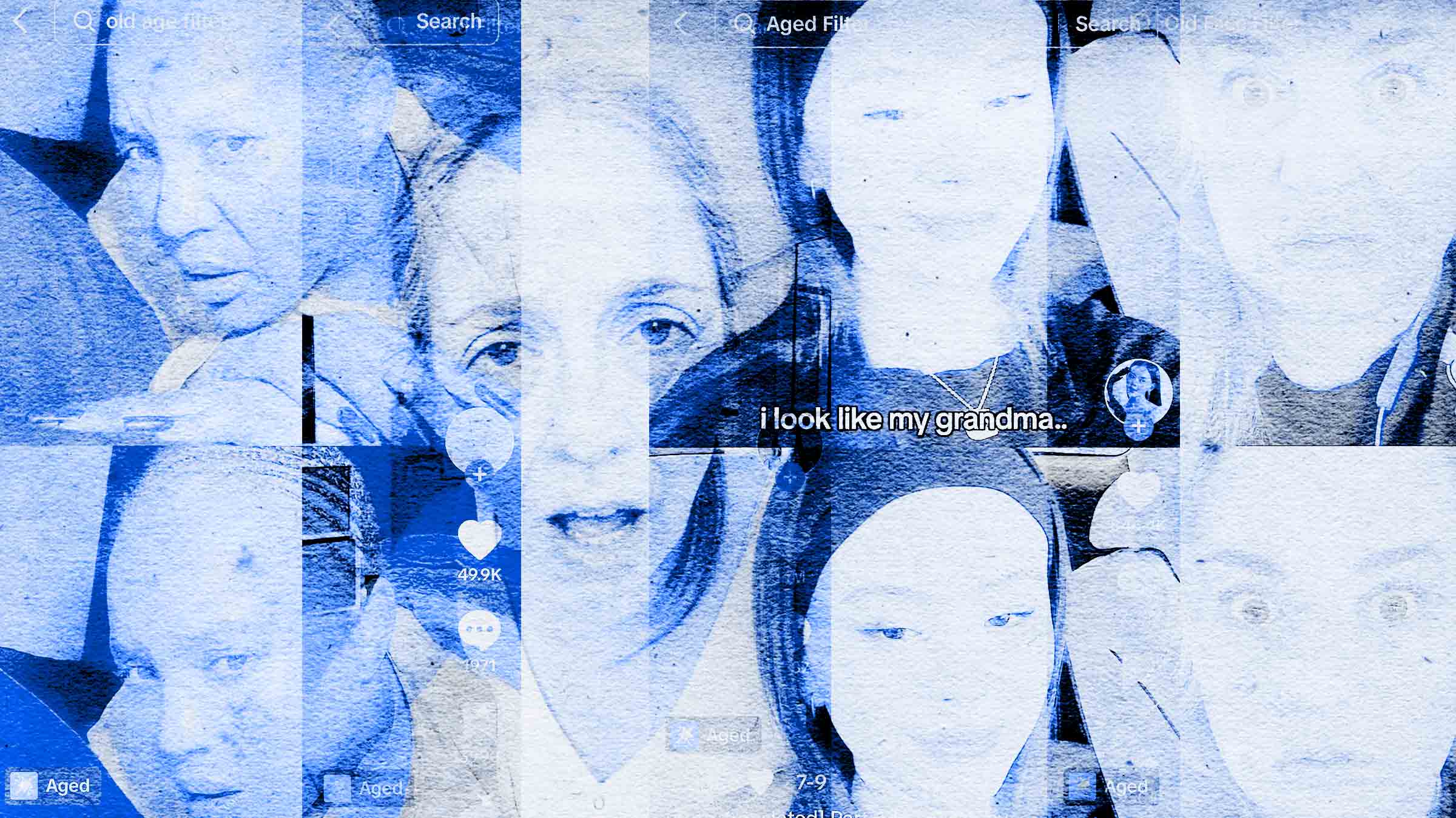The internet is obsessed with looking old, whether we’re “freeing the wrinkle” or shelling out for Botox
I spend each morning unconsciously bracing for the process of aging, beginning my day with a gua sha routine and a warm glass of lemon water. Caught at the apex of the “girl” internet, my 22-year-old eyes seem tired and sunken against the shiny potential of dolphin-like glass skin (à la Barbie). Aging alongside the internet means learning how to smile in hopes of taming crow’s feet later on, and telling people you stopped using straws for “the turtles.” But I will age and I will die—and both are gifts of having lived.
As TikTok’s ‘Aged’ filter rose to virality, users were offered a unique opportunity to confront the curiosities of growing old—or, rather, looking old. The feature, which some dermatologists are calling “very accurate,” employs AI to estimate what we’ll look like as we age—down to every last gray hair—teasing out our prospective futures from the comfort of still clutching onto supple(r) skin. This trend feeds into a growing notion of “aging as conspiracy” (#AntiAging alone has garnered over 5.7 billion views on TikTok), tricking us into believing we can evade the inevitable. Efforts to “free the wrinkle” are outsized by the $200 billion industry dedicated to their demise.
Reactions to #AgeFilter videos fork into two groups: The first, mostly composed of women, generally state that they “can’t wait to meet” their future selves—often remarking on matrilineal resemblances, or the impacts of widespread ageism, above the soft strum of a Mitski song. The other conjures melodrama with a flair of Gen-Z dark humor, summed up by an audio clip from Why Women Kill: “I need to buy a gun.” As we’re sorted into anti-aging and anti-anti-aging camps, the concept of becoming older is positioned in the realm of belief rather than reality.
At my boyfriend’s funeral, his portrait hung at the altar—baby-faced and impossibly animate. “At least he will be hot forever,” my friend joked to fill the air. There is mercy in aging that sunscreen will not save me from.
“Aging alongside the internet means learning how to smile in hopes of taming crow’s feet later on, and telling people you stopped using straws for ‘the turtles.’”
The fine lines of my ‘Aged’ alter-ego mourn for the things he would never have to—sagging skin, jowls, worn-down teeth. I caught myself in a moment of unexpected recognition, despite a parallel desire to protest the filter as a race-less and GAN-ridden dream. As I look at myself, I am many ages at once—with uncanny proximities to the ideals of time, identity, and purpose—and for the first time, my self-image is reflected back with crystal clarity.
For social media natives, understandings of time play a critical role in building identity online. Expanding on danah boyd’s concept of “context collapse,” Petter Bae Brandtzaeg and Marika Lüders coined the term “time collapse,” describing the temporal blurring that occurs when past and present narratives—ephemeral and intangible—can be publicly archived, captured, and accessed. What we come away with is not a concrete reflection of the current moment, but a pile of bygone narrative iterations, each layered thinly atop the one that came before.
In the age of computer vision, eyewitness becomes the arbiter of truth. This is not to suggest the internet has prophetic ability. Rather, it implies a growing preference for revealed over acquired knowledge—the authentic spark of discovery is lost to the techno-solutionist power of AI prediction. With no barrier to entry for digital time travel, a glimpse into the un-promised future comes to cloud our collective present.
In How to Do Nothing: Resisting the Attention Economy, Jenny Odell muses on the function of over-promising productivity in an under-delivering world—caught between the strata of the past and future without the ability to tend to the present. She writes, “Maybe the ‘point’ isn’t to live more… but rather, to be more alive in any given moment—a movement outward and across rather than shooting forward on a narrow, lonely track.” Odell sends a flare for the delight of being alive from a pool of snail mucin, injectables, and life-preserving shortcuts.
Maybe what lies ahead is more than time itself, or the love that is promised when we’re shiny and new. What’s more deceptive than AR filters is the idea that we can sacrifice the present to secure our future. We begin and we end. There is novelty in the infinite choices of what happens in between.







